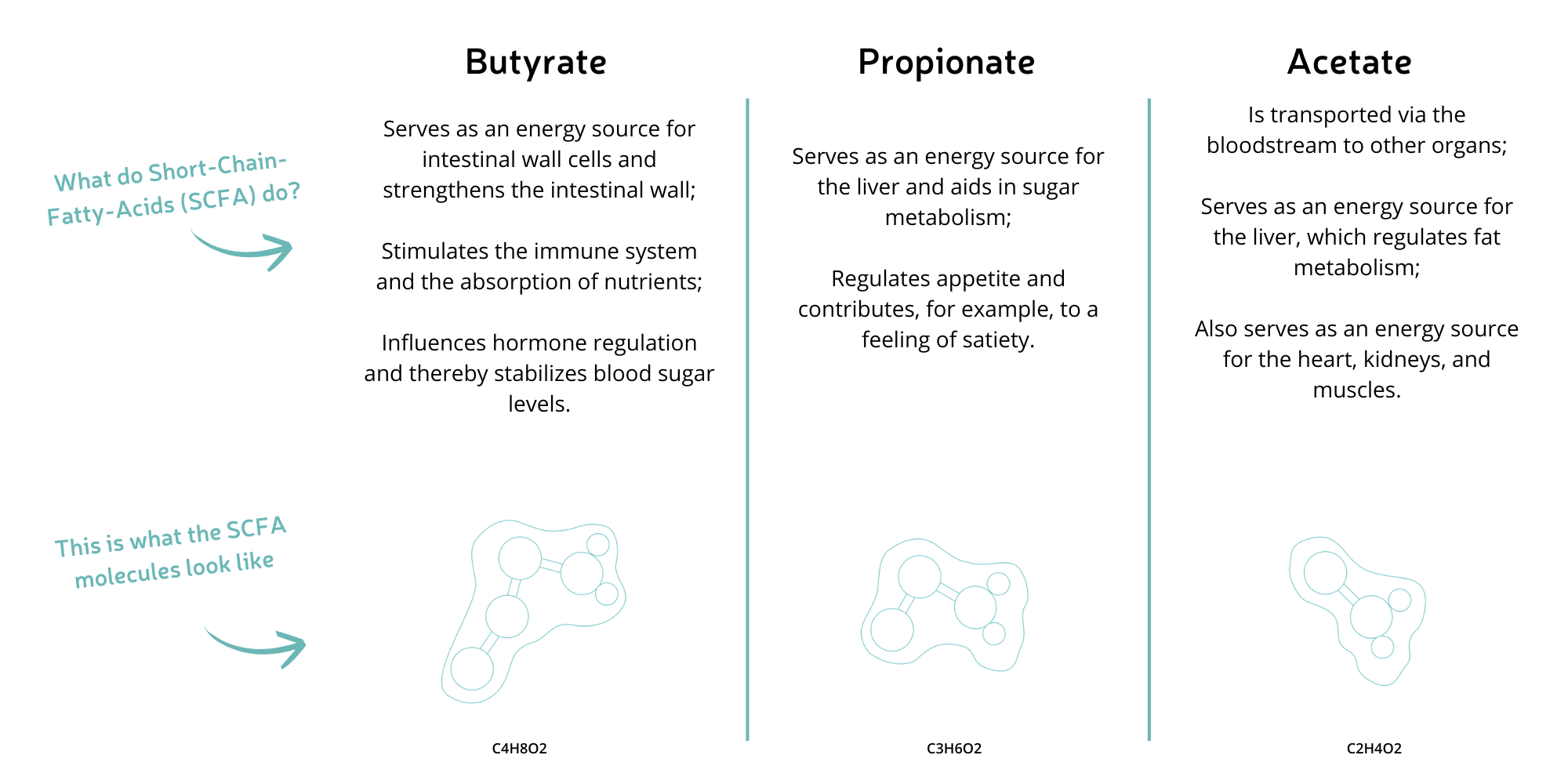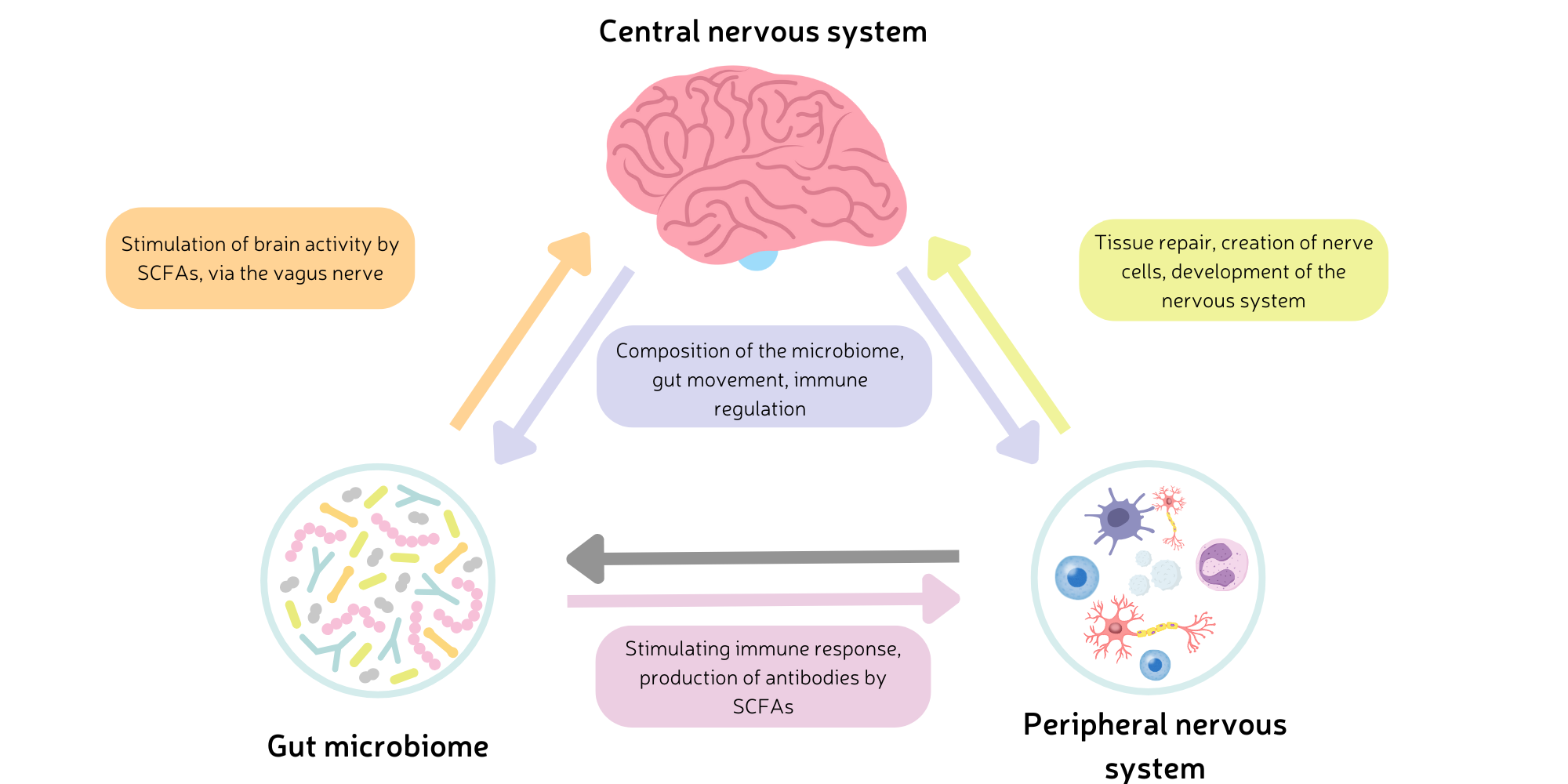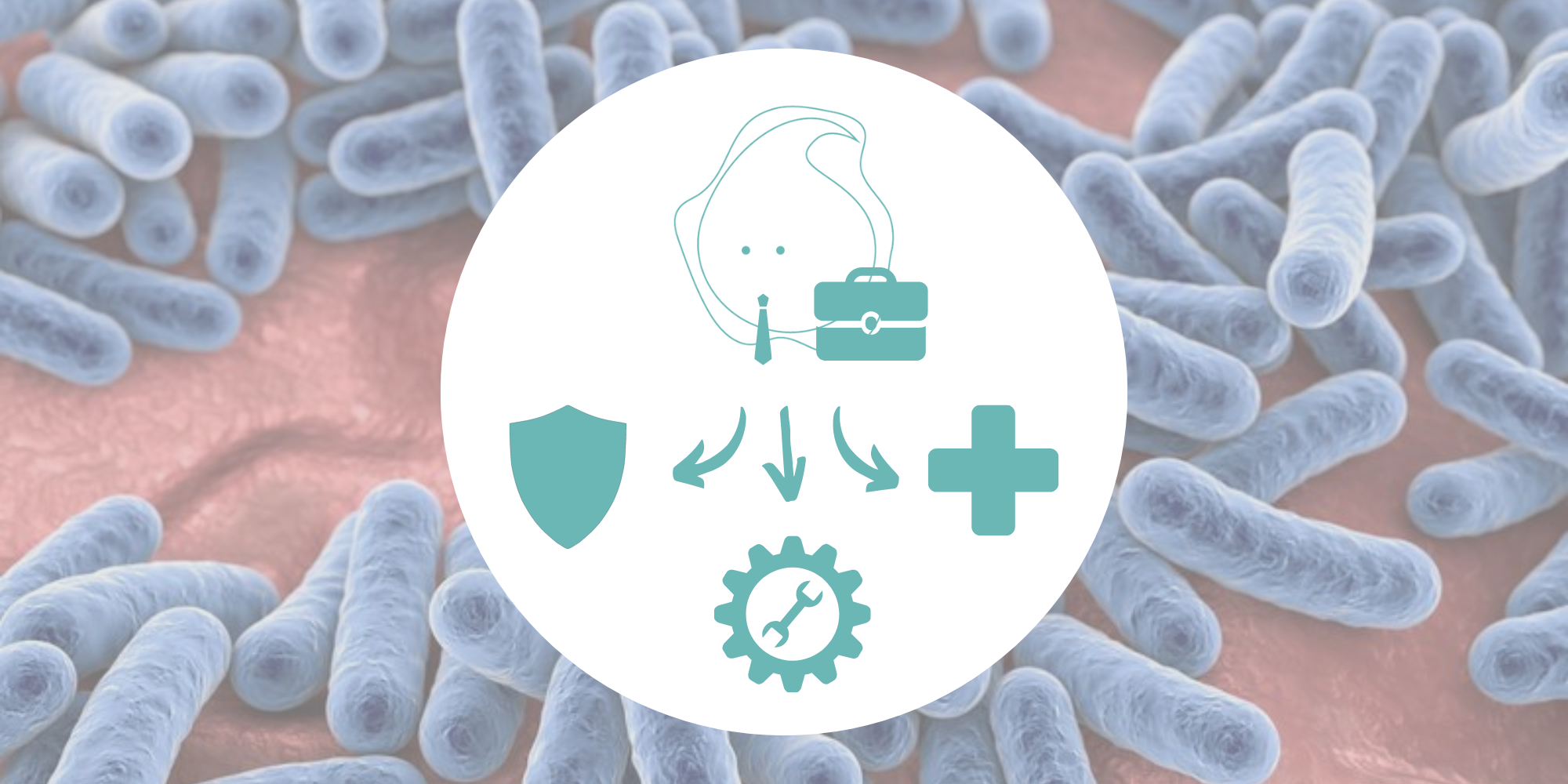The gut bacteria test that gives you insight into your health
- Microbiome test kit
- 16S analysis
- Scientific insights
Learn more
about the microbiota
Last modified: 01-28-2025
You probably know that the bacteria in your gut play a role in digestion. But the microbiota has more functions in your body, like producing vitamins and strengthening your immune system. It can even influence the development of mental diseases. In this article, we will explain how these processes work.
When you eat, the food first enters your mouth, followed by the esophagus, stomach, and duodenum. In these organs, proteins, fats, and carbohydrates are broken down into smaller nutrients: amino acids, fatty acids, and glucose.
The food then moves to the small intestine. This is where most of the nutrients are absorbed. But some substances – especially fibers – are too tough to break down here. And that’s where the microbiota of the large intestine comes in: the gut bacteria break down those tough nutrients into short-chain fatty acids (SCFAs) – this process is called fermentation.
SCFAs are beneficial substances that kick-start various processes in the body. The gut bacteria in our body produce three types of SCFAs, namely butyrate, propionate, and acetate.

Unlike the tough fibers, butyrate is well-absorbed by the intestinal wall cells. It serves as an important energy source for these cells and contributes to a strong intestinal wall. Additionally, butyrate stimulates the production of mucus in the intestines, which strengthens the intestinal mucosal barrier. An intact barrier not only protects against harmful bacteria (pathogens), but also ensures that you absorb enough vitamins and nutrients from your food.
When your intestinal mucosal barrier is too weak, it cannot properly absorb nutrients from the intestines. This can eventually lead to intestinal inflammation.
During the fermentation of fibers, acetate is also produced. Acetate is absorbed by many other organs via the bloodstream, such as the liver, which regulates fat metabolism.
Propionate is also used by the liver, specifically for gluconeogenesis (a part of sugar metabolism). Additionally, propionate helps regulate your feeling of satiety – so you know when you're full.
Gut bacteria and short-chain fatty acids (SCFAs) thus play an essential role in digestion and maintaining healthy intestines. They are involved in various processes in the body. It’s important to keep your intestines and gut bacteria in good shape so they can continue to produce these valuable SCFAs.
Your body is not capable of producing every vitamin on its own – which is normal. That’s why it’s important to get them from the right foods. The bacteria in your gut work together with the food you eat and also produce several essential vitamins, including vitamin K, B11 (folic acid), and B12.
By using the foods mentioned above in your diet, you can already get pretty close to the desired daily amount of these vitamins. A bonus is that your gut bacteria thrive on these foods and produce an additional amount of vitamins.
Vitamin K | Vitamin B11 (Folic acid) | Vitamin B12 | |
Function in the large intestine | Stimulates other gut bacteria to absorb nutrients | Supports the repair of epithelial cells in the intestinal wall | Serves as an energy source for beneficial gut bacteria |
Produced by | Escherichia coli, Bacteroides fragilis | Bacteroides, Lactobacillus, Bifidobacterium | Lactobacillus reuteri, Enterococcus faecium |
Function elsewhere in the body |
|
|
|
Vitamin source | Green leafy vegetables (e.g., spinach, kale), broccoli, Brussels sprouts, fermented foods (e.g., tempeh, miso, natto) | Green leafy vegetables, legumes, fortified cereals, liver, oranges | Meat, fish, dairy, eggs, fortified cereals |
The digestive system is closely connected to the immune system. When pathogens enter or take over your intestines, local bacteria send a signal to activate the immune system.
Imagine a disruption in your microbiota, such as from an antibiotic treatment that messes up the balance of gut bacteria. The treatment slows down the growth of certain types of bacteria, allowing other (harmful) gut bacteria to take over. This activates the immune system. The immune cells recognize the disturbed balance and trigger inflammatory responses.
Between the intestines and the brain is a long nerve, called the vagus nerve, which works like a sort of highway. Signals race between these two organs in both directions. The brain recognizes signals from the intestines and knows when you're satisfied after eating (satiety) and starts bowel movements (intestinal peristalsis). Other signals stimulate the brain by influencing our mood after eating. The highway also works the other way: you probably know the feeling when you're nervous, it can upset your stomach.
The following image outlines the interaction between the microbiome, the brain (central nervous system), and nerves (peripheral nervous system).

Logically, an imbalance in the gut microbiota can cause conditions like irritable bowel syndrome (IBS), liver cirrhosis, and obesity. However, due to the interaction between the gut and brain, an imbalance can also lead to mental conditions, scientists suspect. Recent studies on the gut microbiota have linked it to depression, autism, and Parkinson’s disease (these conditions arise in the first or last years of life). Scientists still haven’t figured out how and if food influences these conditions (!).
In conclusion, it’s important to pay enough attention to your gut. A balanced gut microbiota is characterized by an optimal amount of bacteria that produce SCFAs, a healthy bacterial diversity, and only a small number of unwanted bacteria. Curious about what a healthy and balanced microbiome looks like? Read on on this page.
Dai, L., Mafra, D., Shiels, P. G., Hackeng, T. M., Stenvinkel, P., & Schurgers, L. J. (2023). Vitamin K and hallmarks of ageing: focus on diet and gut microbiome. Nutrients, 15(12), 2727. https://doi.org/10.3390/nu15122727
Dinan, T. G., & Cryan, J. F. (2017). The microbiome-gut-brain axis in health and disease. Gastroenterology Clinics, 46(1), 77-89. https://doi.org/10.1016/j.gtc.2016.09.007
Du, Y., He, C., An, Y., Huang, Y., Zhang, H., Fu, W., ... & Zhao, B. (2024). The role of short chain fatty acids in inflammation and body health. International journal of molecular sciences, 25(13), 7379. https://doi.org/10.3390/ijms25137379
Fung, T. C., Olson, C. A., & Hsiao, E. Y. (2017). Interactions between the microbiota, immune and nervous systems in health and disease. Nature neuroscience, 20(2), 145-155. https://doi.org/10.1038/nn.4476
Hossain, K. S., Amarasena, S., & Mayengbam, S. (2022). B vitamins and their roles in gut health. Microorganisms, 10(6), 1168. https://doi.org/10.3390/microorganisms10061168
Kundra, P., Geirnaert, A., Pugin, B., Morales Martinez, P., Lacroix, C., & Greppi, A. (2022). Healthy adult gut microbiota sustains its own vitamin B12 requirement in an in vitro batch fermentation model. Frontiers in Nutrition, 9, 1070155. https://doi.org/10.3389/fnut.2022.1070155
Pham, V. T., Dold, S., Rehman, A., Bird, J. K., & Steinert, R. E. (2021). Vitamins, the gut microbiome and gastrointestinal health in humans. Nutrition Research, 95, 35-53. https://doi.org/10.1016/j.nutres.2021.09.001
Shi, N., Li, N., Duan, X., & Niu, H. (2017). Interaction between the gut microbiome and mucosal immune system. Military Medical Research, 4, 1-7. https://doi.org/10.1186/s40779-017-0122-9
Thursby, E., & Juge, N. (2017). Introduction to the human gut microbiota. The Biochemical journal, 474(11), 1823–1836. doi: https://doi.org/10.1042/BCJ20160510
Wan, Z., Zheng, J., Zhu, Z., Sang, L., Zhu, J., Luo, S., ... & He, H. (2022). Intermediate role of gut microbiota in vitamin B nutrition and its influences on human health. Frontiers in Nutrition, 9, 1031502. https://doi.org/10.3389/fnut.2022.1031502
Yan, H., Chen, Y., Zhu, H., Huang, W. H., Cai, X. H., Li, D., ... & Li, X. (2022). The relationship among intestinal bacteria, vitamin K and response of vitamin K antagonist: a review of evidence and potential mechanism. Frontiers in Medicine, 9, 829304. https://doi.org/10.3389/fmed.2022.829304
Yoo, J. Y., Groer, M., Dutra, S. V. O., Sarkar, A., & McSkimming, D. I. (2020). Gut microbiota and immune system interactions. Microorganisms, 8(10), 1587. https://doi.org/10.3390/microorganisms8101587
KvK nummer: 65867637
Website door: Ratio Design
This website uses essential cookies to ensure correct functionality. In order to improve our site we can also use optional cookies.
More information